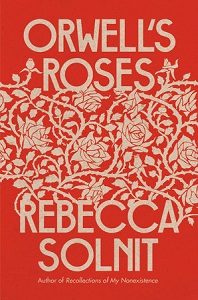
“In the spring of 1936, a writer planted roses.” Each of the seven sections of Rebecca Solnit’s new book starts with a version of this sentence. The writer, of course, is George Orwell. The book develops from his devotion to roses and particularly to the roses he planted in Hertfordshire in 1936.
In a 1946 essay, “
A Good Word for the Vicar of Bray,” Orwell described planting “five fruit trees, seven roses and two gooseberry bushes, all for twelve and sixpence,” ten years earlier. Except for one tree and one rose bush, all were still flourishing.
A few years ago Solnit visited the garden and found the trees gone but some roses enthusiastically blooming. She became convinced that Orwell’s love of roses revealed an important aspect of his life, which is generally seen as pragmatic and focused on harsh realities. She describes this book as “a series of forays from one starting point” (p.15), that 1936 planting. It is beautifully written. Solnit could probably make a description of threading a needle delightful to read.
Each chapter details part of Orwell’s life and connects it to the roses and by extension, to pleasure gained from other flowers, trees, and nature in general. In a 1946 essay “Why I Write,” Orwell explained that he didn’t ever want to lose the affection and wonder he had felt for nature as a child. In an early novel, “The Clergyman’s Daughter,” Orwell creates a miserably unhappy title character, but she finds a moment of delight in a discovery of wild roses. Solnit writes that Orwell did not believe in permanent happiness but did very much believe in the possibility of moments of pure happiness – in his case often connected to roses.
The chapter “We Fight for Roses Too,” describes the origin of the suffragist motto “bread for all, and roses too” (p. 85). Surprisingly, it originated in a 1910 article in “The American Magazine” by Helen Todd. Todd heard a young woman say about a suffragist rally in southern Illinois, that the thing she liked best was that it was “about women votin’ so’s everyone would have bread and flowers too” (p.85). Todd later sent back a pillow marked with the words “’Bread for All and Roses Too.’” Solnit uses this motto as a lead-in to Orwell’s thinking – full of socialist pragmatism but seasoned with a sprinkling of floral pleasure.
Although I have chosen passages in the book that relate specifically to roses and nature, a majority of
Orwell’s Roses deals with Orwell’s life and thinking. The chapter “Buttered Toast” describes Orwell’s experiences in the Spanish Civil War, but also notes that amid the squalor and rats he found beauty: “. . . if you searched the ditches you could find violets and a kind of wild hyacinth like a poor specimen of a bluebell” (p. 103, from “Homage to Catalonia”).
Solnit writes that “The gardens of Orwell are sown with ideas and ideals and fenced around by class and ethnicity and nationality” (p.149), which Orwell acknowledged. She includes a brief history of roses coming from China to England and gives some of the many associations that have grown around the plant, including Elton John’s singing about Princess Diana as “England’s rose” (p. 176).
Shortly before he died in 1950, Orwell asked that roses be planted on his grave. When Solnit visited the site, they were still blooming.